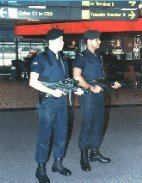Washington Post Completely Misses the Point (or
Misleads)
 We all know our new 'security' costs more than
those who run things will admit; but a Thursday article in the
Washington Post shows either a total misunderstanding
of economics, or is a deliberate attempt to mislead us into
anti-business class warfare.
We all know our new 'security' costs more than
those who run things will admit; but a Thursday article in the
Washington Post shows either a total misunderstanding
of economics, or is a deliberate attempt to mislead us into
anti-business class warfare.
The writer, Sara Kehaulani Goo, says, "Airline passengers paid
the federal government nearly $1 billion for security last year,
more than six times the amount the airline industry paid, according
to the agency in charge of airport security."
The numbers behind the ratio, she points out, were $977 million
vs $160 million. She doesn't make much of the fact that
the TSA mandated the per-leg fees. The conclusion, taken from an
attributed quote of Rep. James Oberstar (D-MN), is that,
"The airlines are not paying their fair
share."
 Let's have a look at this logic: the passengers
pay a direct tax (it's involuntary, and imposed by government, so
it's a tax, even if it's called a "fee") that put nearly a billion
bucks directly into the TSA's pocket, money that Congress didn't
have to take from the (flying and non-flying) public in
other taxes. The airlines also spent $160 million, trying to keep
up with the TSA's demands.
Let's have a look at this logic: the passengers
pay a direct tax (it's involuntary, and imposed by government, so
it's a tax, even if it's called a "fee") that put nearly a billion
bucks directly into the TSA's pocket, money that Congress didn't
have to take from the (flying and non-flying) public in
other taxes. The airlines also spent $160 million, trying to keep
up with the TSA's demands.
Now, let's suppose "the airlines" had to pay more of the total
tab. Nowhere is there any indication that this would lower the
TSA's demand for the $977 million -- the idea is that "the
airlines" should simply pay more. OK -- say you buy that argument,
because "it's fair." Where, pray tell, will "the airlines" get the
money? Yup -- from the passengers. Who pays?
The TSA, of course, is arguing that, because they were so
successful in extracting more money from passengers, that the
airlines, already crushed under increasingly-expensive mandates and
losing passengers to the "hassle factor," should simply charge the
fliers more.
 The TSA doesn't want to incur the additional wrath
of a grumbling populace, so it wants the airlines to front for it,
in its enhanced revenue-collection scheme. The TSA, already having
overspent and thus embarrassed its nominal boss (Secretary of
Transportation Norm Mineta), isn't likely to lose another
capo by actually asking Congress to cover its bloated tab.
[John Magaw, the TSA's first boss, got Mineta into embarrassingly
hot water last summer, through his profligate spending. Magaw was
quickly dismissed, when the public started asking Congress why he
-- already -- needed more money --ed.]
The TSA doesn't want to incur the additional wrath
of a grumbling populace, so it wants the airlines to front for it,
in its enhanced revenue-collection scheme. The TSA, already having
overspent and thus embarrassed its nominal boss (Secretary of
Transportation Norm Mineta), isn't likely to lose another
capo by actually asking Congress to cover its bloated tab.
[John Magaw, the TSA's first boss, got Mineta into embarrassingly
hot water last summer, through his profligate spending. Magaw was
quickly dismissed, when the public started asking Congress why he
-- already -- needed more money --ed.]
Michael Wascom, a spokesman for the Air Transport Association,
put a kinder spin on the mess: "We're optimistic that as a new
Congress convenes and as a variety of challenges continue to face
the industry, that this particular issue can be resolved in an
amicable fashion. There are a variety of other pressing issues that
command our attention, such as rising fuel prices and excessive
taxation."
In the final lines of the story, Goo mentions, almost offhand,
that, "Airlines, which received $5 billion in cash assistance from
Congress after the terrorist hijackings, balked at paying the $750
million sought by Transportation because they said they have not
been reimbursed for up to $4 billion in other security costs...
[and] said they still plan to press for a 'rollback' of security
expenses." Then she added the following piece of nonsensical
'reasoning:' "They also hope to have the $2.50 fee eliminated
because they say it prevents them from raising prices."
[emphasis added]
 ANN's Daily Aero-Term (05.01.24): Say Altitude
ANN's Daily Aero-Term (05.01.24): Say Altitude ANN's Daily Aero-Linx (05.01.24)
ANN's Daily Aero-Linx (05.01.24) Classic Aero-TV: Korean War Hero Twice Reborn
Classic Aero-TV: Korean War Hero Twice Reborn Airborne 04.29.24: EAA B-25 Rides, Textron 2024, G700 Deliveries
Airborne 04.29.24: EAA B-25 Rides, Textron 2024, G700 Deliveries Airborne Affordable Flyers 05.02.24: Bobby Bailey, SPRG Report Cards, Skydive!
Airborne Affordable Flyers 05.02.24: Bobby Bailey, SPRG Report Cards, Skydive!





